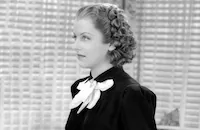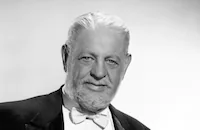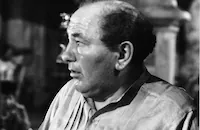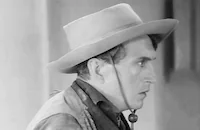It Can't Last Forever
Cast & Crew
Hamilton Macfadden
Ralph Bellamy
Betty Furness
Robert Armstrong
Raymond Walburn
Thurston Hall
Film Details
Technical Specs

Synopsis
Russ Matthews and Al Tinker are theatrical agents whose clientele is made up of second-rate acts. However, one client, Dr. Fothergill, "The Master Mind," has promise if only his predictions could be proven accurate. Russ hires Louis, a professional burglar, to steal the famous Sultana Pearl. Then, Russ arranges a press conference for Fothergill to announce the whereabouts of the gem. However, Fothergill arrives drunk, and Russ dons a magician's costume and poses as the Master Mind, who then tells the police where to find the jewel. Then, Russ stages a horse-race hoax. Cindy Wilson, a reporter for the Chronicle discovers the ruse, but when Russ threatens her editor, Fulton, with a libel suit, she is forced to drop the story until she has further proof, and is assigned to do a human interest story on Fothergill. Fothergill gains popularity, and unknown to Russ, a mobster, Cronin, acquires the fan mail addressed to him. Cronin then swindles the fans into crooked stock deals. Carol gets wind of the scheme and threatens to expose Russ, who later learns that Fothergill sold his mail to Cronin. Russ tries to discredit Fothergill, but his plan backfires when, at a boxing match, the underdog, Torpedo Hansen, upsets his opponent just as Fothergill predicted. When Carol finds the dejected Russ, she realizes he is innocent. Russ returns to his apartment to find Cronin, who tells him to leave the racket alone. Meanwhile, Carol has gone to the police, and during his next broadcast, Fothergill asks his fans to visit and gives them Cronin's description. The resulting mob allows Cronin to be apprehended, and after Carol phones in her scoop, she and Russ hide together from the crowd in a telephone booth.

Director
Hamilton Macfadden
Cast

Ralph Bellamy

Betty Furness

Robert Armstrong

Raymond Walburn

Thurston Hall
Ed Pawley
Wade Boteler

Charles Judels
Armanda And Lita
Jackson Brothers
Barbara Burbank
Morella Brothers
Dandridge Sisters
The Blenders
O'conner Family

Paul Fix
Donald Grayson
Paul Stanton
Clyde Dilson
Pat West
William H. Royle
Edward Hearn

Robert Walker
Billy Wayne
Eddie Laughton
Jack Gardner
Jack Perry
Agnes Anderson
Edward Peil Sr.
Harry Depp
John T. Murray
Nick Copeland
Beatrice Curtis
Jack Dougherty
Walter Shumway
Dave Montrose
Pat Shockley
Frankie Dolan
Cy Schindell
Ralph Robertson
Maria Melesh
Harry Bernard
George Chesebro
Charles King
Gus Reed
Marc Lawrence
Crew
Irving Briskin
Cliff Broughton
Harold Buchman
Harry Cohn
George Cooper
Harry L. Decker
Kalloch
Lee Loeb
Herb Magidson
Paul Mertz
Gene Milford
Ben Oakland
Allen G. Siegler
Morris Stoloff

Film Details
Technical Specs

Articles
Marc Lawrence (1910-2005)
Born Max Goldsmith on February 17, 1910, in the Bronx, Lawrence had his heart set on a career in drama right out of high school. He enrolled at City College of New York to study theatre, and in 1930, he worked under famed stage actress Eva Le Gallienne. Anxious for a career in movies, Lawrence moved to Hollywood in 1932 and found work immediately as a contract player with Warner Bros. (an ideal studio for the actor since they specialized in crime dramas). He was cast as a heavy in his first film, If I Had a Million (1932). Although his first few parts were uncredited, Lawrence's roles grew more prominent: a sinister henchman in the Paul Muni vehicle in Dr. Socrates (1935); a conniving convict aiding Pat O'Brien in San Quentin (1937); a menacing thug stalking Dorothy Lamour in Johnny Apollo (1940); the shrewdly observant chauffeur in Alan Ladd's breakthrough hit This Gun For Hire (1942); and one of his most memorable roles as Ziggy, a fedora wearing mobster in the Bogart-Bacall noir classic Key Largo (1948).
Lawrence, when given the opportunity, could play against type: as the prosecuting attorney challenging Tyrone Power in Brigham Young (1940); a noble aristocrat in the Greer Garson-Walter Pidgeon period opus Blossoms in the Dust; and most impressively, as a deaf mute simpleton in the rustic drama The Shepherd of the Hills (both 1941). Better still was Lawrence's skill at comedy, where his deadpan toughness worked terrifically as a straight man against the likes of Joe E. Brown in Beware Spooks (1939); Abbott and Costello in Hit the Ice (1943); Penny Singleton in Life with Blondie (1945); and Bob Hope in My Favorite Spy (1951).
After that, Lawrence's career took a turn downward spin when he was labeled a communist sympathizer during the Hollywood witch hunts of the early '50s. He was exiled in Europe for a spell (1951-59), and when he came back, the film industry turned a blind eye to him, but television overcompensated for that. Here he played effective villains (what else?) in a series of crime caper programs: Peter Gunn, Johnny Staccato, The Untouchables, Richard Diamond, Private Detective; and eventually made a welcome return to the big screen as a returning exiled gangster in William Asher's underrated mob thriller Johnny Cool (1963).
It wasn't long before Lawrence found himself back in the fray playing in some big box-office hits over the next two decades: Diamonds Are Forever (1971), The Man with the Golden Gun (1974), Marathon Man (1976), Foul Play (1978); and The Big Easy (1987). Sure he was cast as a gangster, but nobody could play a rough and tumble mob boss with more style or conviction.
Interestingly, one of his finest performances in recent years was in television, as a severely ill old man unwilling to accept his fate in a fourth season episode of ER (1997-98). His last screen role was just two years ago, as a nimble minded VP in Looney Tunes: Back in Action (2003).
In 1991, Lawrence published a memoir about his venerable career, Long Time No See: Confessions of a Hollywood Gangster that received much critical acclaim. He has also developed a cult following due to his appearances in such offbeat items as From Dusk to Dawn and Pigs aka Daddy's Deadly Darling, the 1972 horror film he directed and starred in with his daughter Toni. He is survived by his wife, Alicia; two children from a previous marriage, Toni and Michael; and a stepdaughter Marina.
by Michael T. Toole

Marc Lawrence (1910-2005)
Quotes
Trivia
Notes
The working title for this film was With Kind Regards.














